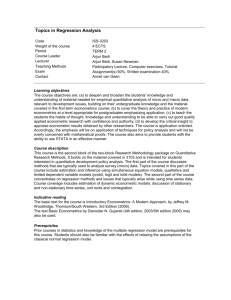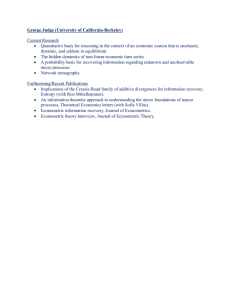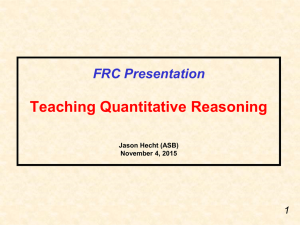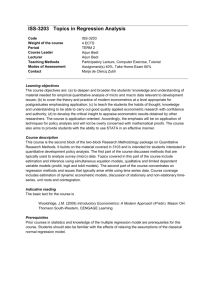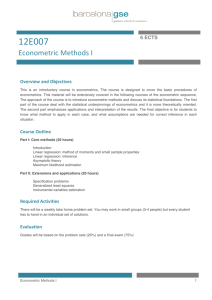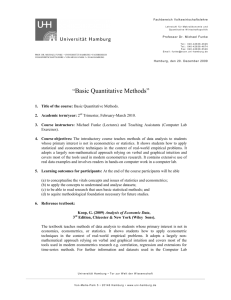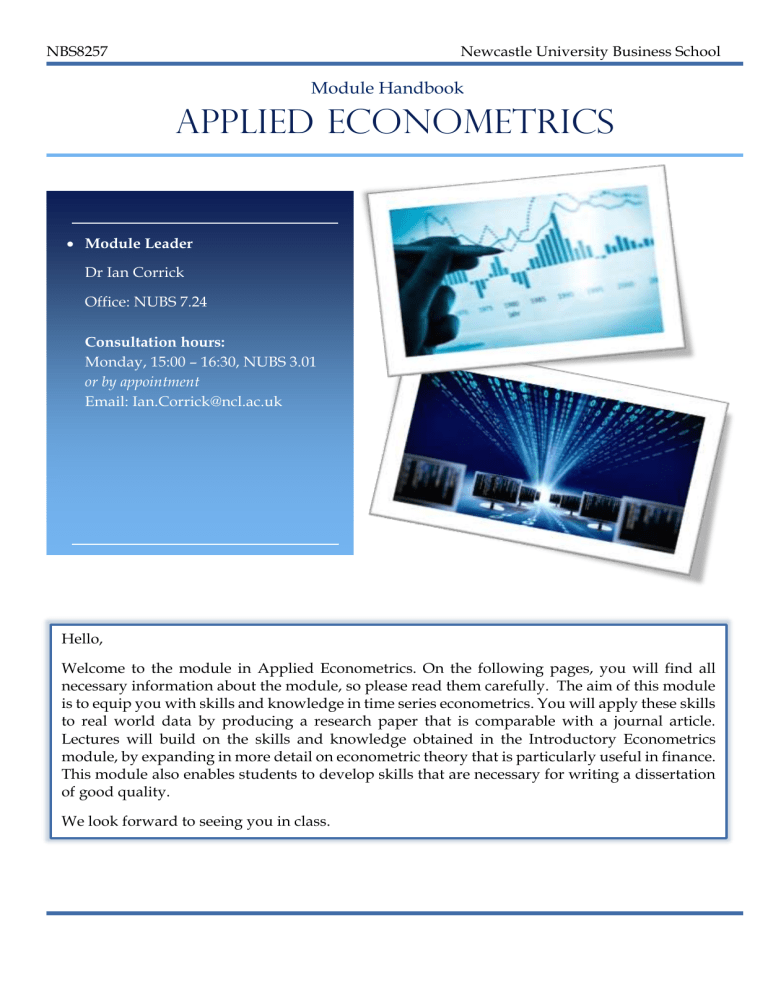
NBS8257 Newcastle University Business School Module Handbook APPLIED ECONOMETRICS Issue, Date Module Leader Quisque: Dr Ian Corrick Mau Office: NUBS 7.24 Consultation hours: Monday, 15:00 – 16:30, NUBS 3.01 or by appointment Email: Ian.Corrick@ncl.ac.uk 2 Feugiat: 3 4 Hello, Welcome to the module in Applied Econometrics. On the following pages, you will find all necessary information about the module, so please read them carefully. The aim of this module is to equip you with skills and knowledge in time series econometrics. You will apply these skills to real world data by producing a research paper that is comparable with a journal article. Lectures will build on the skills and knowledge obtained in the Introductory Econometrics module, by expanding in more detail on econometric theory that is particularly useful in finance. This module also enables students to develop skills that are necessary for writing a dissertation of good quality. We look forward to seeing you in class. NBS8257: Applied Econometrics 1. Module aims, learning outcomes, and research-informed teaching Aims • To equip you with skills and knowledge in quantitative methods applied to real world data. • To teach you how to use econometric software to analyze data and how to critically interpret its output. • To give you an opportunity to produce a research paper that is comparable with a journal article. Students will learn how to apply sophisticated quantitative methods and procedures to produce a research paper. Lectures build on the skills and knowledge obtained in the semester 1 econometrics module, by expanding in more detail on econometric theory that is particularly useful in finance and international economics. The main focus is on the application of quantitative methods to real world data using econometric software and on the preparation of an independent research paper that is comparable with a journal article. Seminars provide practical experience in obtaining and analyzing data using a computer. This module enables students to develop skills that are necessary for writing a dissertation of good quality. Intended Knowledge Outcomes At the end of this module: o You will be able to find relevant economic or financial data and choose and justify econometric methods that are appropriate for their analysis. o You will be able to explain different econometric methods relevant for the analysis of time series data and interpret the results from their execution in econometric software. Intended Skill Outcomes At the end of this module: o You will be able to correctly execute econometric methods in appropriate econometric software. o You will be able to present the results of your quantitative analysis in a professionally accepted format and evaluate your conclusions in relation to the literature. NBS8257 – Applied Econometrics How research informs this module Research is at the heart of your programme of study. In this module, you will be engaging with research in the following ways: 1. Learning about research in your discipline: You will learn about classic and applied research in your discipline through the lectures on fundamental time series methods and through your own independent study. 2. Engaging in student-led research discussions: you will read, analyse and evaluate research articles related to your project and apply theory to a real-life situation in preparing a research report. 3. Developing research skills: You will learn about how research is conducted and how knowledge is produced in a robust manner through the lectures and in the PC tutorials where you will get a hand-on experience in the use of statistical software for data analysis. 4. Undertaking research and inquiry: You will conduct research in the form of literature searches, desk research and empirical research related to the empirical group project. Assurance of Learning The Business School has three overarching learning goals that graduates from all our programmes should attain. These goals are derived from our mission and are Disciplinary Competency “Our graduates will have acquired a theoretical understanding of their chosen subject area and its applied relevance to contemporary business and management practice.” Ethical Awareness “Our graduates will have the ability to understand and articulate relevant ethical values, principles, rights, and virtues from the point of view of different stakeholders.” Global Perspective “Our graduates will have critical awareness of the interactions of individuals and organisations within a global community and an awareness of issues affecting the global business environment.” In this module we will cover Disciplinary Competency. We will assess the learning goal in the final unseen written examination and group assignment. Results from these assessments are collected separately for quality assurance purposes and feed into the continuous improvement of our programmes. They also form a core part of our AACSB accreditation. NBS8257: Applied Econometrics 2. Module Schedule This module consists of lectures, practical exercises and live demonstration/Q&A sessions (as well as independent study, of course). The materials for each week will be provided via Canvas and released weekly. This is to help you schedule your study. However, should you ever wish to study ‘ahead’ of the released materials you can use the syllabus outline and reading guide on Canvas to do so. Lectures In the course of the lectures, we will cover the following topics: Obtaining data from different sources: recognizing the importance of descriptive statistics; commenting on the moments of the data. ARMA Modelling and Forecasting: the analysis of financial data, identification of the key characteristics for identification, estimation of the data generating process of financial variables, execution of diagnostic tests, forecasting and forecast evaluation. Unit roots: Dealing with persistence of economic and/or financial data, determining whether shocks to data are transitory or permanent, the problems of spurious regressions in finance. Cointegration: Single equation cointegration, long run economic or financial relationships between variables, the error correction model, analyzing and interpreting the short run and long run analysis of financial and economic variables. Correct interpretation of the output of econometric software and inferences from the output. The synthesis of the results from analyzing the data using advanced quantitative methods. Preparation of an independent research paper that is comparable with a journal article. NBS8257 – Applied Econometrics Practical Exercises One of the main goals of this module is for you to be able to implement the various models and methods using R. All work for the group report must be done in R. On Canvas you can find links to valuable resources for learning R. R (and RStudio) is available to you through the university’s Remote Desktop Service. R and RStudio are freely available to install on your own PC, should you wish to do so (the Remote service might not be supported on GNU/Linux, but if you are running GNU/Linux then you should be able to install R via your distribution’s repositories). https://www.r-project.org/ https://rstudio.com/ Note that skills in R might also be useful when working on your Master’s dissertation. Therefore, it is a good idea to devote some time to regularly practice and improve your skills in R. Groupwork You are asked to form a group of 4 students. There is NO flexibility as to group size, but you are free in selecting your group members. All groups must be formed by the beginning of the second week of the semester. If you are not in a group by then, please send an e-mail to the Module Leader and he will allocate you to a group. Further details on group registration will be explained in the first lecture. Please note that you may not change groups or opt out of group work. Just as in a professional situation, you are expected to work together to overcome any difficulties (including personal differences) in order to bring a task to a successful conclusion. We expect you to resolve any problems in your group by drawing on your previous experience and learning on this programme. The mark you will receive for the group project will in part (20%) depend on how your group members evaluate your contribution to the group work. Further details will be explained in the Assessment Information on Canvas. It is a part of groupwork that students are expected to deal with conflicts and disputes within the group. However, in the (rare) cases of very serious differences within the group, the group members may raise this with the Module Leader. Issues must be raised well before any assessment deadline, to allow sufficient time for their resolution. At the Module leader’s discretion, following investigation of the issue, the Module leader may decide to reduce the grade (including awarding a zero grade) of any individual in the group or require an alternative form of assessment (with the grade normally capped at 50%), where that individual is deemed not to have contributed adequately to the group’s work. NBS8257: Applied Econometrics 3. Attendance and Participation You are expected to attend all classes and engage with the materials covered. This means that you are expected to: 1. arrive on or before the advertised time for all classes 2. prepare for all classes by reading and doing other preparation work as specified in advance 3. proactively participate in the learning in class and in any groupwork 4. give respect and consideration to your peers and tutors We wish to establish an environment that encourages learning through: 1. two-way communication that is supportive and challenging at the same time 2. openness in expressing views, feelings and opinion with respect for others whose views may differ 3. appreciation that everyone is different and that differences can lead to new perspectives on both social and intellectual interaction 4. constructive ways of dealing with differences 5. openness to give and receive honest feedback 6. willingness to explore ambiguity without jumping to obvious (and often incorrect) conclusions early on Be aware, however, that the boundaries between what is and is not acceptable may vary between cultures and individuals and that you may be required to challenge your assumptions around such issues and to be open to change. The module team will mediate such discussions where appropriate and will help you ensure that behaviour and communication is productive. NBS8257 – Applied Econometrics 4. Reading List All course materials, as well as announcements, will be published on Canvas, so check it regularly. The main textbooks for the module are: Wooldridge, Introductory Econometrics: A Modern Approach, 7th edition Bekes and Kezdi, Data Analysis for Business, Economics and Policy Asteriou and Hall, Applied Econometrics, 2016 edition These are available either in hard copy or electronically via the University library website. Note that the above are to some extent equivalent – when readings are suggested from all three of these you need only use one (although of course you might wish to also refer to the others, as sometimes a slightly different presentation is helpful even if the content is fundamentally the same). 5. Communication & Feedback on your work Canvas is the main mechanism by which we will communicate. We recommend that you check it regularly for any updates. Lecture and computer practical material will be made available on Canvas as the course progresses. Note that questions about exercises and course material should not be asked via e-mails. For these there is a Discussion Board on Canvas. The lecturer will regularly visit the Board and provide feedback. This way of communication is preferred as it also enables other students to benefit from the discussion. Keep e-mails for questions of a personal matter which are not of potential interest to your classmates. You are also welcome to use the staff consultation hours. We value your informal feedback over the course of the module. Rather than wait for the next Student-Voice-Committee meeting or the module evaluation questionnaire, we encourage you to come to talk to us about your experiences on the module. Most issues can be addressed relatively quickly! 6. Assessment Your final mark is composed of a written final exam (50%) and a written group report (50%). See ‘Assignments’ on Canvas for detailed information on assessment and marking criteria in this Module. NBS8257: Applied Econometrics In addition to the requirements detailed under Assignments you should also make sure that you understand additional guidance on academic writing, referencing and plagiarism provided as part of your programme of study. Note that plagiarism is a serious offence that can lead to you failing the module and suspension from studies.
